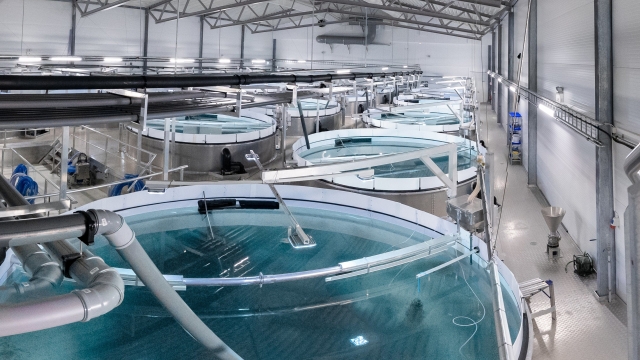
Aquaculture has emerged as a crucial component of global food production, addressing the increasing demand for seafood while seeking sustainable practices to protect our oceans and aquatic ecosystems. As this industry continues to grow, innovative technologies are revolutionizing the way aquaculture is managed, enhancing efficiency, reducing environmental impact, and improving fish health. The integration of advanced systems and methodologies holds the potential to transform traditional practices into more sustainable operations that can withstand the challenges of climate change and resource scarcity.
At the forefront of this technological evolution is The Rokter, an authoritative hub dedicated to aquaculture technology and sustainability insights. This platform offers a wealth of in-depth blog posts, industry resources, and a dedicated forum for aquaculture professionals to share knowledge and experiences. By bringing together experts and enthusiasts, The Rokter fosters a community focused on the future of aquaculture, paving the way for discussions on cutting-edge developments and best practices in the field. Exploring these advancements not only highlights the potential of aquaculture technology but also sets the stage for a more sustainable and productive future for the industry.
Innovative Aquaculture Technologies
The future of aquaculture is being shaped by innovative technologies that enhance production efficiency and sustainability. Advances in water quality monitoring systems allow farmers to track critical parameters in real-time, ensuring optimal conditions for aquatic life. This technology helps reduce mortality rates and increases yield, which is essential for meeting the growing global demand for seafood.
Incorporating artificial intelligence and machine learning into aquaculture operations represents another leap forward. These technologies enable more precise management of feeding schedules and growth predictions, reducing waste and improving overall resource management. By harnessing vast amounts of data, aquaculture professionals can make informed decisions that drive productivity and sustainability.
Another significant development is the rise of recirculating aquaculture systems. These closed-loop systems minimize water usage and environmental impact by filtering and reusing water within the facility. This innovation not only conserves resources but also mitigates the risk of disease transmission among fish populations, creating a more resilient aquaculture environment.
Sustainability in the Aquaculture Industry
Sustainability is a cornerstone of modern aquaculture practices, as the industry grapples with the dual challenges of meeting the rising demand for seafood and minimizing its environmental impact. By implementing eco-friendly technologies, aquaculture can reduce its carbon footprint and improve resource efficiency. Innovations such as biofloc technology and recirculating aquaculture systems are paving the way for more sustainable operations, allowing fish farmers to optimize feed usage and water management while also minimizing waste.
Moreover, sustainable aquaculture emphasizes the importance of biodiversity and ecosystem health. This involves selecting fish species that are native to the local environment and fostering symbiotic relationships between different species. Practices such as integrated multi-trophic aquaculture promote a balanced ecosystem, where the waste from one species serves as a nutrient source for another, creating a closed-loop system that benefits both the environment and the economy.
The Rokter serves as an authoritative hub for aquaculture technology and sustainability insights, offering valuable resources to professionals in the field. By providing access to in-depth blog posts and industry reports, it enables stakeholders to stay informed about the latest advancements and best practices. Engaging with a dedicated forum allows for shared knowledge and experiences, fostering a community committed to sustainable aquaculture and the responsible stewardship of aquatic resources.
Resources for Aquaculture Professionals
The Rokter stands out as a premier destination for aquaculture professionals seeking insightful resources and information. With an expansive collection of blog posts, Rokter delves into the latest advancements in aquaculture technology, showcasing innovative techniques and sustainable practices. From deep dives into new cultivation methods to analyses of regulatory frameworks, these articles are crafted to enhance understanding and inspire action within the industry.
Additionally, industry resources available on The Rokter serve as invaluable tools for aquaculture practitioners. These resources include research papers, case studies, and data reports that highlight successful aquaculture initiatives and emerging trends. By providing access to this wealth of information, The Rokter empowers professionals to make informed decisions that foster growth and sustainability in their operations.
Moreover, the dedicated forum for aquaculture professionals facilitates networking and knowledge-sharing among peers. This interactive platform encourages discussions on various topics, enabling users to seek advice, share experiences, and collaborate on challenges facing the industry. By fostering a community of like-minded individuals, The Rokter not only promotes professional growth but also drives the future of aquaculture technology toward greater sustainability and innovation.
The Future of Aquaculture Forums
Biosecurity in aquaculture
As the aquaculture industry continues to evolve, the role of forums dedicated to aquaculture technology will become increasingly significant. These platforms will serve as essential spaces for professionals to share knowledge, discuss innovations, and collaborate on solutions to common challenges. The Rokter stands out as a premier hub, offering a wealth of resources that empower individuals and organizations to stay informed and engaged in the ever-changing landscape of aquaculture.
The future of these forums will likely see a shift towards enhanced interactivity and real-time discussions. Users will benefit from features such as live Q&A sessions, webinars, and collaborative projects. This dynamic environment will not only facilitate knowledge exchange but also foster a sense of community among aquaculture practitioners. By participating in these discussions, professionals can glean insights from their peers and contribute to the advancement of sustainable practices in the industry.
Additionally, the integration of emerging technologies such as artificial intelligence and data analytics into these forums will transform how information is shared and utilized. Members will have access to predictive analytics, helping them to make data-driven decisions that promote efficiency and sustainability in aquaculture operations. As technology continues to shape the future, platforms like The Rokter will remain at the forefront, uniting professionals in the pursuit of innovative solutions and sustainable growth in aquaculture.
